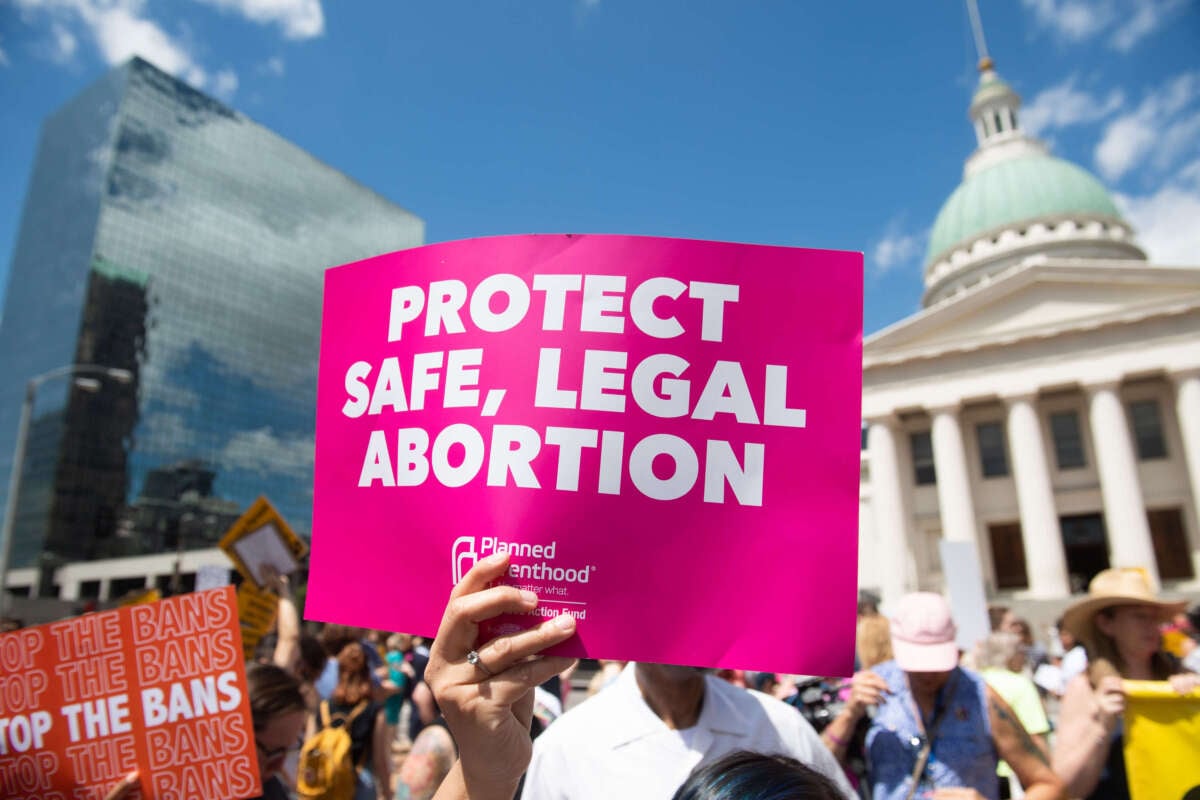Did you know that Truthout is a nonprofit and independently funded by readers like you? If you value what we do, please support our work with a donation.
Three mayors in the state of Missouri have filed an amicus brief in the case relating to an abortion rights ballot question that was supposed to appear before voters this November, but which a lower court judge, late last week, said had to be removed.
The brief, filed by the nonprofit civil rights organization Public Rights Project (PRP) on behalf of the mayors, urges the Missouri Supreme Court to reverse that judge’s ruling. The state’s highest court is set to hear and decide on the appeal on Tuesday, which is when ballots for the November general election are supposed to be finalized.
“The Missouri Supreme Court has the opportunity today to protect voters’ right to decide on this issue, and we’re proud to stand with local government executives from across the state to urge them to do so,” Jill Habig, founder and CEO of PRP, said in a press release statement shared with Truthout.
Kansas City Mayor Quinton Lucas, Columbia Mayor Barbara Buffaloe and St. Louis Mayor Tishaura Jones all signed on to the amicus brief. Joining them in a non-mayoral role was St. Louis County Executive Sam Page.
On Friday, state circuit court Judge Chris Limbaugh ruled that the amendment measure should be removed from the ballot for technical reasons. Although the ballot signature drive collected more than twice the signatures needed for the measure to appear on the ballot, Limbaugh found that the measure didn’t properly define what a “person’s fundamental right to reproductive freedom” is, and therefore, that it was a “blatant violation” of the constitution’s requirement to define terms clearly.
That finding is debatable, however, as the measure clearly states that it would enshrine “the right to make and carry out decisions about all matters relating to reproductive health care, including but not limited to prenatal care, childbirth, postpartum care, birth control, abortion care, miscarriage care, and respectful birthing conditions.” The measure also specifically states that lawmakers are allowed to regulate abortions after the point of fetal viability.
Chief Judge Anthony Gabbert, an appellate level judge in the state, ruled on Saturday to expedite the appeal to the Missouri Supreme Court. The state’s highest court will hear arguments, and rule on the matter, on Tuesday.
“There is no ‘direct precedent’ — or precedent at all … for a court to strike a measure from the ballot because a secretary of state-certified ballot text was insufficient,” the amicus brief from the three mayors states, adding:
It makes little sense on this rushed posture to break that new ground. It makes even less sense to rush through a decision that would irrevocably deprive the current Missouri electorate the opportunity to vote on [the measure.]
In the press release shared with Truthout, Lucas added that Missourians should “have the right to participate in shaping laws that govern their lives.”
“But by removing the reproductive rights measure from the ballot at the eleventh hour, the lower court is silencing voters’ voices and undermining the principles of democratic self-government that this State and Country were founded upon,” Lucas went on.
It is clear, at least according to recent polling, that voters want to pass the measure.
According to a St. Louis University/YouGov poll published last month, 52 percent of residents in the state back the measure, while only 34 percent oppose it. Another 14 percent say they’re unsure.
A simple majority of support in the final vote tally is all that’s needed to enshrine the measure into the state constitution.
Missouri’s abortion “trigger” ban went into effect right after the U.S. Supreme Court’s 2022 Dobbs v. Jackson Women’s Health decision, which upended abortion protections that were established by Roe v. Wade. Missouri now has a near-total abortion ban, allowing no exceptions for an abortion (including for rape or incest) except when a person’s life is at risk — a standard that many other states have included in their bans, but which in practice is rarely enforced, due to physicians’ fears that the state may not agree with what constitutes a life-or-death decision.
Media that fights fascism
Truthout is funded almost entirely by readers — that’s why we can speak truth to power and cut against the mainstream narrative. But independent journalists at Truthout face mounting political repression under Trump.
We rely on your support to survive McCarthyist censorship. Please make a tax-deductible one-time or monthly donation.
